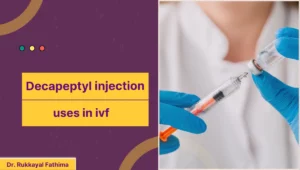Infertility is a major medical issue that has been growing recently, and a major number of people, men and women alike, suffer from it. While there are many treatments for infertility, the main issue here is that people don’t know if they have infertility issues and don’t know when they should visit a fertility specialist.
A fertility specialist can help you identify the cause of infertility and recommend the right treatments to rectify the issue. They can also help with assisted reproductive techniques (ARTs) which will let couples conceive a child through artificial methods.
This article discusses some reason why and when you should consult a fertility specialist to successfuly concieve and have a child.
When Should I See a Fertility Specialist?
1. You cannot conceive after a year of regular, unprotected sex
It is a general rule that a couple will be considered infertile if they cannot conceive after a year of regular, unprotected sex (intercourse without using any type of birth control). This is usually the case when the individual or couple is under 35 years of age.
2. You are above 35 years old
While it is a year for couples under the age of 35, the time period to determine infertility is substantially decreased for those above the age of 35. Here is what you should do to determine your infertility.
- If you are above 35, you are considered infertile if you cannot get pregnant after six months of trying.
- If you are above the age of 40, it technically comes under high-risk pregnancy, and you might want to start by consulting your fertility specialist. This is because the risk of miscarriage is greater at this age.
3. You have had miscarriages in the past
Miscarriage is when the foetus does not last for the full nine months of pregnancy and results in a healthy pregnancy. Most often, miscarriage happens when the foetus dies within 20 weeks of pregnancy. Miscarriages can happen due to
- The quality of the egg or sperm is low,
- The egg or sperm has the wrong number of chromosomes, thus resulting in abnormal development of the baby,
- The embryo doesn’t implant properly in the uterus, and
- The embryo has other structural defects.
If you have had miscarriages in the past, you might want to seek the help of a fertility specialist before you start planning to have a child.
4. You suffer from no periods, irregular periods, or heavy periods
Issues related to your periods may indicate that you have problems ovulating properly. Your brain may be sending the wrong hormonal signals, or you might not be ovulating if you are having trouble with your periods.
You might want to consult your fertility specialist or gynaecologist to check if you have any problems with your uterus and your body’s hormonal balance.
5. You have reproductive issues
Your fertility can be impacted if you have existing reproductive issues that may disrupt the normal functions of your reproductive organs. Some reproductive issues that may lead to infertility are,
- Polycystic Ovary Syundrome (PCOS),
- Endometriosis,
- Uterine fibroids, and
- Primary Ovarian Insufficiency (POI).
6. You or your partner have STIs (Sexually Transmitted Infections)
Sexually Transmitted Diseases, formerly called Sexually Transmitted Diseases (STDs), are contagious infections that are spread through sexual contact. They can cause infections or inflammations in both men and women.
STIs are one of the major causes of infertility and should be treated immediately. They can also affect the quality of the egg and sperm.
7. You have a chronic medical condition
You might want to seek your fertility specialist if you have any of the below chronic or long-term diseases.
- Diabetes
- Heart disease
- Hypertension
- Thyroid conditions
- Genetic disorders
- Kidney disease
8. You have cancer or have undergone cancer treatment
You should also consult your fertility specialist if you have or have had cancer and undergone its treatments (chemotherapy). Cancer treatments can impact a woman’s ability to conceive a child based on their age and the type and dosage of the treatments.
If you have been diagnosed with cancer, you can opt for fertility preservation measures (cryopreservation) and preserve your eggs, sperm, or embryos for future use.
Causes of Infertility in Women
- Ovulation disorders such as polycystic ovary syndrome (PCOS), hyperprolactinemia, and hypo or hyperthyroidism.
- Age. As women age, the quality and the number of eggs produced also reduce.
- Endometriosis. A situation where tissues that grow inside the uterus start growing outside of them.
- Any abnormalities with the structure of the uterus can cause infertility. E.g., uterine septum and uterine fibroids.
- Damage in the fallopian tubes caused by ectopic pregnancy or pelvic inflammatory disease can cause infertility.
- Cancer, especially those related to reproductive organs (breast and cervical cancers), and the subsequent treatments (radiation & chemotherapy) can affect a woman’s fertility.
Causes of Infertility in Men
Hormonal issues that arise due to issues with hormonal glands, including the pituitary, thyroid, adrenal glands, and hypothalamus, can affect the functions of the male reproductive system.
- Immunity problems, where the body creates anti-sperm antibodies against the sperm produced.
- Infections or inflammatory diseases like epididymitis (inflammation of the epididymis) and orchitis (inflammation of testicles).
- Heredity and genetic diseases like cystic fibrosis and hemochromatosis.
- Environmental factors include heavy exposure to industrial chemicals (pesticides, organic solvents, etc.), radiation (X-Ray), and heat.
- Lifestyle factors like the usage of alcohol, tobacco, steroids, or marijuana.
- Obesity can cause hormonal changes in the body and cause infertility.
Conclusion
Infertility and its treatment procedure may seem overwhelming and can exert physical and mental pressure on you. But it would all be worth it when you realise that you have the chance to have a child of your own.
If you feel that you have the above mentioned issues, meet your fertility doctor today and get treated accordingly.








